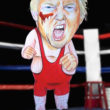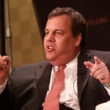Editor’s note: Last month’s Gallup Poll gave President Bush his first-ever approval rating of less than 50 percent—49 to be exact, an 11 point drop from his early-January standing. Bush also trailed, according to Gallup, in a head-on match with the now-almost-certain Democratic presidential nominee, Senator John Kerry of Massachusetts—46 percent to 53 percent for Kerry.
Some of that drop is being blamed on Vice President Dick Cheney, described in a Newsweekheadline as “A Problem in the Bunker,” and in Time as a man who “seems to amplify the president’s liabilities” and whose “gravitas now feels more like gravity, dragging Bush down.” The former Nixon staffer—and Nixon whistle-blower—John Dean says, “Bush’s people have out-Nixoned Nixon’s people.”
Beyond his hard-line rhetoric justifying the Bush administration’s pre-emptive war in Iraq, the current VP, or “veep”—the old Washington shorthand for vice president—keeps getting involved in bad-news making controversies. They range from his connections with Halliburton to his duck hunting vacation with Supreme Court Justice Antonin Scalia, just as the high court is considering whether to order Cheney to make public the records of his closed White House meetings with energy industry executives.
A Time-CNN poll last month found that 43 percent of its respondents wanted to see Cheney on the Bush 2004 ticket, but 42 percent wanted him gone. Then we heard from Redington Jahncke, an investment banker and life-long Independent who lives in Connecticut. He became so disturbed by the administration’s radical foreign-policy doctrine of pre-emptive, unilateral military action that he decided to take some action of his own.
He registered as a Republican and drove to New Hampshire to enter the Republican primary as a vice-presidential candidate so he could launch a remarkable—but little noticed in the press—protest campaign against this administration’s new foreign policy, its manifestation in Iraq and its principal architect, Dick Cheney. Now that’s exercising the democratic process.
“Red” Jahncke, as he is widely known, polled 22 percent of the vote in the surprisingly rough Republican primary election in New Hampshire, against Cheney’s 42 percent. But together with another Republican anti-Cheney challenger and the thousands of Republicans who shunned Cheney by writing in the names of Democratic presidential contenders instead, the Cheney opposition got 51 percent of the votes.
That didn’t suggest that Jahncke will be a contender for the G.O.P. vice presidential nomination at the Republicans’ national convention in New York in late August. He is not a convention delegate and says he doesn’t plan to be there.
His campaign was a symbolic protest on a single issue, which appropriately pitted him against Cheney—and now against Cheneygate, the label beginning to be applied to a vice president increasingly being questioned about his business connections.
Red Jahncke, who is only a recent reader of the Washington Spectator, sent us the following explanation of his month-long anti-Cheney campaign. It is the principled saga—of Jahncke the Yankee.
Who runs for Vice President? No one does, right? Wrong! I ran this year in New Hampshire, the only state where a vice presidential contest is part of the presidential primary. You weren’t aware of this race? Feel no shame: when asked, most New Hampshire citizens were also unaware. Nevertheless, in somewhat schizophrenic fashion, tens of thousands cast their votes for vice president on primary day.
The incumbent vice president was in the primary race whether or not he wanted to be. And Dick Cheney did not. He did not register as a candidate and did not spend one minute campaigning in the state. Nevertheless, he was the one certain candidate—the 600-pound gorilla and the overwhelming favorite.
THE PROTEST—Here’s why I ran. It was as a protest candidate on one single issue. I appealed to New Hampshire voters to “vote for your choice for president and vote for me for vice president if you oppose the current administration’s arrogant and dangerous new foreign policy doctrine of pre-emptive unilateral action.”
History has shown that running as a “protest” presidential candidate or as an “independent” or “alternative” party candidate is both quixotic and counterproductive. Take Ralph Nader in 2000. He garnered 2 percent of the vote, and his efforts backfired. Many believe that he helped throw the election to his ideological nemesis.
What happened in New Hampshire this year? How did David do against Goliath? Well, history repeated itself. As in the biblical tale, we slew the giant. I say “we” because my vote was only part of the opposition that denied Cheney a majority.
This phenomenon has gone almost totally unnoticed because the attention of the media and the nation has been consumed by the Democrats’ presidential primary horse race. And that is what happened to me in New Hampshire. I went largely unnoticed in the dust-up of the furious Democratic primary.
But I did not go totally unnoticed, and I did not receive the half-embarrassed, half-nervous stare that people cast upon crazy men. Quite the opposite. Of course, with no advertising budget, I didn’t reach most New Hampshire voters. However, in the sub-zero climate I received an almost universally warm reception from those I did reach.
LESSONS LEARNED—One lesson I take from the experience is a healthy respect for my fellow citizens and a more jaundiced view of experts. My campaign was certainly unorthodox, but ordinary citizens got it immediately.
The owner-operator of a gas station got it in 45 seconds: “Simple,” he said. “I am against this stupid war, so I vote for you and give up nothing by doing so.” Directly across the street, it took the news director of a major New Hampshire media organization almost 15 minutes to grasp the same idea.
Now, to be fair, the press is a quasi-public institution with an obligation to winnow real news from a daily procession of self-promoters. So it was appropriate for the news director to take 15 minutes to vet me and my candidacy. Once he was comfortable that I was not one of the many “colorful characters” who participate in New Hampshire’s wide open primary—all that’s required of candidates is a $1,000 registration fee—our discussion turned quite serious.
Another reporter admitted that when he received an assignment to profile my struggle, he expected “some kind of vanity campaign.” He went on to interview several academics in the field of political science, all of whom were ignorant of even the possibility of what I was doing. Their ignorance was not surprising, but it has been done before. In 1992, Endicott Peabody, former governor of Massachusetts, registered as a formal VP candidate in order to advance his name for consideration by his party’s eventual presidential nominee.
These anecdotes address the central challenge that I faced in my campaign. In order to warrant serious media coverage, a candidacy must present itself in a serious fashion. This involves a classic Catch-22, since a candidacy can only acquire a serious presence on the strength of serious media coverage. Moreover, I was an unknown first-time campaigner, apparently seeking an unattainable office. Everybody knows that VP nominees are chosen at party conventions by presidential nominees—not in the New Hampshire primary.
Nevertheless, I held to my central mission of attracting serious coverage by the media. I was certainly not going to win the election by meeting thousands of New Hampshire voters in person. I had neither the time nor the resources to do that.
I was not running with either the intention or the prospect of becoming a paid public officeholder. And I could afford only a month, at most, away from my business. Nor was I likely to raise significant campaign funds, and I didn’t. Thus, there could not be any TV advertising, any canvassing, any roadside signs, any schedule of Jahncke town hall meetings.
Furthermore, my campaign could not really be planned in advance. First, planning itself takes time. Second, more significantly, campaigners are like fish. They do not live except in the water. I had to be in New Hampshire to know what to do in New Hampshire. On January 2, I drove to New Hampshire with the intention of staying there for most of that month.
I would not have ventured forth without some key campaign elements in place. As I began I had three promising events scheduled. On January 2, I appeared on a live radio talk show in central New Hampshire. On January 6 the New Hampshire Political Library hosted an “All Candidates Forum,” at which, in fact, only “minor candidates” made appearances. However, the forum was covered by all New Hampshire newspapers, some national newspapers and five TV stations.
Finally, I had been invited to speak on January 7 at the prestigious Phillips Exeter Academy, where several major candidates, including John Kerry, Wesley Clark and Howard Dean, also spoke. Thus, I was assured of some reasonable media coverage at the start. My Exeter speech was covered in a lengthy article in a southern New Hampshire newspaper, and the Forum event was broadcast several times on C-Span. In addition, I had two other critical bases covered.
First and foremost, a volunteer had stepped forward to create a campaign website. He did a fabulous job creating www.redforvp.com. That gave my campaign a presence that is still attracting increasing numbers of visitors. Second, I had contributions of a couple of thousand dollars, enough to fund my most basic out-of-pocket expenses.
MY MAIN ISSUE—Why did I run? I ran against the current administration’s unilateralist foreign policy because it is illegitimate by definition. If one nation acts alone it thinks that it is right. However, legitimacy is conferred by the agreement of others.
The current administration acted alone in Iraq. The “coalition of the willing” was a sham. The administration claimed to have 47 allies in its “coalition.” To appreciate the emptiness of this claim, take a map of the world and color in the members. In the Western Hemisphere, for example, there were just seven members, six tiny Central American nations and Colombia. Four were microscopic Pacific island nations that can scarcely be found on a world map.
What meaningful role could the Marshall Islands, Micronesia, Palau or the Solomon Islands play in the “coalition”? What role could there be for another 25 “coalition” members whose annual economic product is less than that of Massachusetts? Simple: the “coalition’s” only membership requirement was “political support,” in White House words.
The Administration was so desperate to find “coalition” members that it included Afghanistan, which is like including an open-heart surgery patient on the roster of the hospital staff. The administration also included Turkey based upon the alternative-membership qualification of granting American military aircraft “over-flight rights.” Having denied the U.S. overland passage for troops and equipment for the planned northern front of the Iraq invasion battle plan, Turkey was really no supporter of the administration’s invasion.
Of the nine remaining members of the “coalition,” only three provided combat troops for the invasion: 200 Polish troops, 2,000 Australian troops and 45,000 British troops. British troops were reduced to 11,000 within months, leaving a ratio of about 10 U.S. troops for each “coalition” ally soldier. Some coalition!
At the United Nations, there were 10 obviously opposed Security Council members. With this in mind, the administration’s claim to have U.N. approval for the invasion of Iraq was empty indeed. In fact, the invasion lacked the support or consent of virtually all international organizations: the Arab League, the European Union, NATO and the Organization of American States.
Put the absence of international approval in context. Immediately after 9/11, the whole world expressed its sympathy for our nation and rallied in support of our initial actions to combat terror. NATO adopted a resolution approving U.S. action to invade Afghanistan and root out the terrorist Taliban and Al Qaeda organizations.
So, when it came to Iraq, the world was not asleep. The world was not obstructionist. The U.N. was not lost in some meaningless peacetime debate. That the world did not back us on an Iraq invasion should have given pause to a prudent U.S. leadership.
Iraq is a long way from New Hampshire, but it was at the heart of my New Hampshire campaign. I ran because I saw a way to make a difference on perhaps the most momentous issue of a generation. Already, Iraq has cost this nation dearly in blood, treasure and international standing.
The New Hampshire vice presidential primary provided a ballot box opportunity to launch a direct challenge to the administration’s dangerous new foreign policy doctrine that led us into Iraq and a direct challenge to the doctrine’s primary architect, Dick Cheney.
What was accomplished is unambiguous. The result is in plain sight. The sitting vice president and his unilateralist ideology were resoundingly rejected by voters in his own party in a direct contest at the ballot box on January 27.
In a small state, and in a largely overlooked race, a minor candidate contributed to the defeat of the sitting vice president of the United States and a repudiation of his dangerous ideology.
So it is not necessarily the most votes that carry the day, but rather it may be the right number of votes in the right place at the right time. In the 1968 New Hampshire primary, Eugene McCarthy defeated an incumbent president, President Lyndon Johnson, on the strength of just 27,000 votes.
THE IMPACT—Will my 5,800 votes have a similar impact? I’m hoping for a similar, but certainly not equal, impact. McCarthy’s primary success in New Hampshire was immediate worldwide news, and weeks later L.B.J. withdrew from the race for re-election.
By now the full results are in for the Republican vice presidential race in this year’s New Hampshire primary. The sitting vice president, a man with a national reputation of decades’ standing, has been rejected by voters in his own party—defeated by a field of unknown and opposition party candidates. That cannot bode well for his future prospects, nor those of the Administration in which he serves.






0 Comments